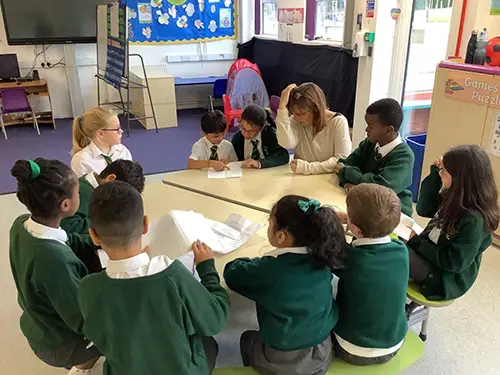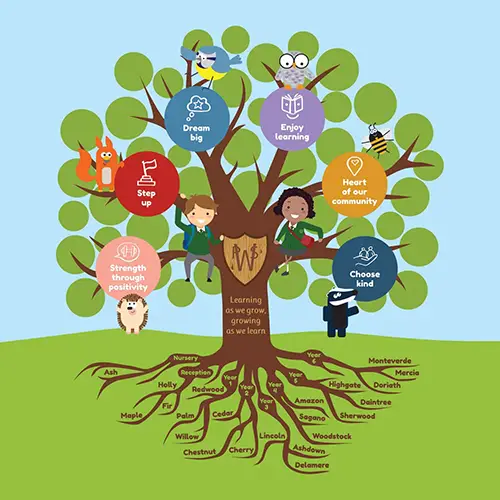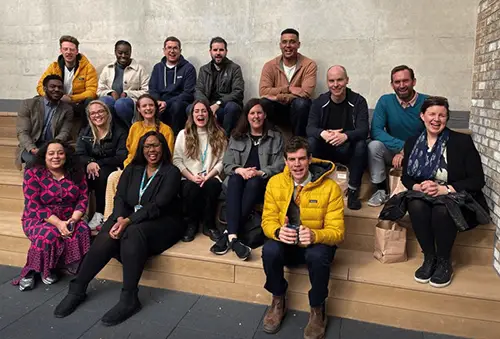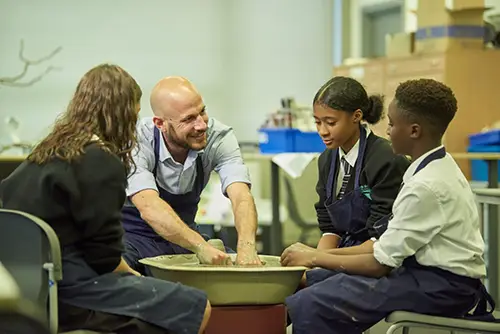"We thought, wow! We were impressed with the enthusiasm and passion we saw."
Pinner Wood is a three-form entry Primary School located in an outer London borough and has around 670 pupils. It serves a mixed demographic where 14% of pupils are entitled to Free School Meals and has a rich diversity in terms of heritage, culture and religion. The school had been on a long journey with the previous headteacher taking the school from requires improvement to an Ofsted ‘outstanding’ rating in 2011. When the previous headteacher retired in July 2017 the school had a strong base and ‘a great staff team’, the new leadership team felt it was time to put their stamp on the school and take the focus a little bit wider than the current curriculum which had previously focused heavily on English and Maths.

Sarah Marriot had been Deputy Head at Pinner Wood for 10 years, and upon taking on the headship five years ago, came across the work of school 21. She explains; “I was very interested in what they were doing and felt it fitted with what I wanted from education…I went to visit [School 21, a school within Big Education’s Multi-Academy Trust] and was inspired by it. I thought, I really want to be part of that and I’m really interested in that way of thinking…then I saw the BLA [Big Leadership Adventure] course advertised on their website and felt that it aligned with my principles and what I wanted to do and what we were trying to achieve as a school.” The Big Leadership is a leadership programme that develops the capabilities and conditions to innovate and deliver an education of the head (academics), heart (character and wellbeing), and hand (creativity and problem solving).
Jo Bretayne, a Deputy Head at Pinner Wood, explained that the school had always had a very child-centred ethos and the Big Education approach and philosophy complemented what they were already doing and built upon their holistic view of education. It was education focused on the whole child; and was about developing the child in a way that would give them the skills to be valued and successful members of society, skills such as problem solving, taking ownership and having a broader awareness of the world and the opportunities it offers.
Furthermore, both Sarah and Jo had been impressed by the staff-led projects at School 21. Jo explained, “We thought, wow! We were impressed with the enthusiasm and passion we saw. Staff see themselves as researchers, as academics… it was quite powerful to see that in action, and to see professionals really excited about their own action projects and thinking of themselves as part of that sort of academic body and raising the profile of themselves as teachers. This was something we were seeking to achieve in our school to empower our staff team to take on research projects.”
Sarah believed that staff at Pinner Wood felt ready to build upon their current practice and embrace new ways of working. For example, the ways in which the wider curriculum was taught, but she needed to find the ways and means to hear their ideas and develop a programme of change that had been designed by all staff. She said; “ I felt that [the staff] had the potential to influence me, and I felt that people wanted something new and exciting. I had the backing of the staff and my leaders, and the governors for these changes. But what was really the challenge was ‘what is that change going to look like?’”
The school began by reviewing and revising their school values, aiming to include everyone from governors and school staff to parents and pupils. The new school values were launched last year and staff agree that they now permeate all aspects of school life. Every half term the school focuses on one of the values and all of the values are referenced and brought to life in the classroom, assemblies and discussions about behaviour and conduct. They’re also referenced in job advertisements, school policies and appear on displays in the classroom. Year 6 pupils act as values champions and house points link back the school values as well. Gemma, Key Stage leader for years 5 and 6 said “It’s not even been a year since we’ve introduced them and everybody from children to parents to staff have all embraced them. We’ve linked the values to the school vision and made them really purposeful. It’s in everyone’s everyday vocabulary, we constantly use it all the time.”
Following involvement in the BLA another key focus for change has been the introduction of an oracy curriculum driven by newly appointed oracy leads within the school. The headteacher, Sarah explained “in a nutshell, it’s teaching children to communicate effectively; – how to talk, how to listen and how to conduct those conversations. We are embedding oracy skills into everything we do.” To this end, the school is taking part in an oracy course through Voice 21 [a charity founded by School 21] and every member of staff has undertaken an oracy research project. As a result, oracy now permeates everything within the school and staff also have a specific programme of strategies to promote oracy amongst pupils including ‘talk tokens’ and ‘partner sentence stems’ with the aim of getting children to ‘know the purpose of talk and impact of talk.’
A move to a stronger oracy curriculum has taught pupils that its ok to have different opinions and disagree with one another. The rule is it is ok to disagree as long as you can do this politely and justify your view. This, Jo explains, has seen “an enormous shift in how pupils use talk… visibly and audibly. Children have always been listened to at Pinner Wood but we’ve really given them a voice. We’ve taught them how to talk face to face, and how to learn through talk”.

Oracy skills are also being developed through the school’s new project-based approach to learning. Jo explained: “learning through a project based approach is completely different. And really, really exciting… The organisation of those lessons is now different; we block them, which we didn’t do before. You can really get in deep into a subject. And the children can then bring their ideas to it and go off on their own and research, separate bits of it and all come back together to do this big ending… We have witnessed pupils embedding themselves into the learning rather than it just being ‘this is your geography lesson. 45 minutes on a Wednesday afternoon, and you’ve got another one on a Friday afternoon’.”
When reflect on the impact of a project-based approach on pupils, Gemma said the “enjoyment and engagement of the children has honestly flourished. It’s getting them to be in control of their own learning, you can see a dramatic improvement; they look forward to the stunning starts, because it’s getting them intrigued into what they’re going to be learning. And they really love the showstoppers to showcase everything that they’ve learned.”
This engagement in and excitement about their learning, Jo said, has enabled pupils to make stronger connections between the concepts they are learning about and make connections between lessons a lot more readily. Jo feels she has really witnessed a change in pupils’ learning behaviours with pupils now more interested in reading around subjects and sharing what they have learnt, rather than a primary concern about what level they are on. Not only that, but the renewed focus on values alongside a move to the oracy curriculum has improved pupils’ ability to contribute to conversations about some complex concepts and show themselves to be ‘big thinkers’ who can confidently share their views and knowledge with other pupils and staff. Jo said, “I love assemblies now, they are so interactive, the children are now used to talking and listening with one another. They are a pleasure. And, that’s the big education 100%.”
Sarah concluded that “I think the pupils feel valued, they feel at the centre of everything that happens at Pinner Wood. Much of our work is about empowering them to have a voice and step up and be part of leading the organisation. I think they feel that as well.”

The Big Leadership Adventure trains leaders in a coaching methodology that supports the creation of a developmental culture, where staff are empowered and feel safe to take risks. Pinner Wood have been working to build a culture around the coaching tools [known as the Big 8], and staff are now expected to use a ‘coaching and contracting’ approach to their practice. Gemma feels that leaders take time to engage in meaningful discussions with other staff about what’s going well, what’s made something more or less successful. Having received coaching via the Headteacher, Gemma has first hand experience of how effective this method can be in helping others to find their own solutions. This, she says has given her ‘a voice’ and tools to support others. She has used this experience to coach and manage her own team. She explained, “if someone comes to you with a problem, you straight away want to try and fix it for them. The coaching tools help you to guide them to a solution themselves. I just think it’s brought a culture of togetherness. And people feel really listened to.”
Project-based learning and contracting is also part of the school’s wider efforts to develop team-work skills and develop a research-based approach to change. To this end, Pinner Wood is also in the process of establishing working groups to explore a variety of issues within the school. These working groups consist of teachers, governors, support staff and parents and use the BLA-inspired ‘design-thinking’ approach to address thematic areas of school life including parent voice, pupil voice, learning environments and trips and experience. A literacy working group has already looked at the range of books within the library and assessed them for diversity and inclusion and are working on a project for World Book Day.
Indeed, diversity and inclusion has been a further focus for the school. Drawing upon the training Sarah received through the BLA on this subject, she has now developed a school wide project where every stakeholder within the school (from teachers through to the site team) have joined a working group. Each group has a focus and are looking at every aspect of school life through the lens of diversity and inclusion. This includes, but is not limited to, aspects of the curriculum, books, displays and parent and pupil voice.
Jo’s view is that the BLA has supported the headteacher, Sarah, to establish what her own view of education is and drive forward change based on that. Indeed, Sarah concurred when she said that the BLA has helped her to establish her philosophy of education. She said that the programme as a whole has helped her to “make that a reality and vocalise that with others and really think about what I want from education… it’s helped me bring about our values and our vision… I’ve learned a lot about what I’ve wanted from the curriculum and what that should look like. It has totally changed how I feel as a leader, I don’t feel any more that I’ve got to solve everyone’s problems and have all the answers… the three day coaching training has absolutely changed the way I have conversations with people and the way that I have approached meetings. I feel very inspired by it, I feel it’s given me new energy. I think it’s been good for my own well being; it’s given me space away from school, to have time to just think, to reflect, to connect, and given me practices that have also enhanced the well being of my school and the staff.”
Sarah also explained how the programme had connected her with a wide range of people and she had been able to visit their schools and see the impact of their work as well as invite them into her school under a spirit of openness. Furthermore, developing connections with professionals outside of schools, and in government and business in particular, has inspired Sarah with new perspectives and new tools.
Establishing new ways of working has also strengthened the SLT, who now use their regular meeting times and not just to discuss school operations but really focus on the essence of leadership. According to Jo, people work very much as a whole team, “our meetings have a clear structure and we reflect on ourselves as school leaders. We look at what is going well and what we need to develop about ourselves as leaders and across the wider school.”
When asked to compare the BLA with other CPD they have received, Gemma felt that, in comparison with other courses she has accessed, it is modern. It has allowed her to carry out research into aspects of schooling (such as school values) that have impacted widely across the school. This has not always been the case on other courses.
“Reflecting on her NPQH, the headteacher, Sarah, said “I did it because I knew that I was going to be stepping into headship, and it would be a useful qualification to have. However The BLA is completely different. This course gets you thinking, this gets you connecting with the content. This is about you… as a person and as the leader. It is not ‘here’s the skills to run a budget. Here’s the skills to manage staff’… it’s completely different and requires you to be so much more reflective. I have had to connect with it and bring myself. It has pushed me out of my comfort zone to really think about me as a leader now and the leader I still want to be”.
The headteacher, Sarah, said of the BLA trainers, “their view on what they think education should be really aligns with my view on what I think education should be… an education of the whole child – head, heart and hand. They’re very knowledgeable, and they’re very skilled.” She continued “the modules were very powerful. The coaching module was just amazing. And actually, considering we did that online, it was hugely powerful. The philosophy for education module last year, was challenging, and really got you thinking. At times it was quite uncomfortable knowing that you’d have to present a speech to others on my views, but it’s good to go out of your comfort zone… It’s made a big difference; to me and to my school and I’ve got so much from it- more than I thought I would get when I signed up for it. I thought it’d be a good experience, and it would be interesting, and I’d see new things. But actually, what I didn’t plan for is the connections, the experiences, the shifts in my thinking and all of that is part of the Big Education as well.”

Big Education Trust is a company limited by guarantee registered in England and Wales.
Company registration number: 07648389.
VAT number: GB142676505
Registered Office: c/o School 21, Pitchford Street, London E15 4RZ
Privacy Policy | Terms & Conditions
| Cookie | Duration | Description |
|---|---|---|
| cookielawinfo-checkbox-analytics | 11 months | This cookie is set by GDPR Cookie Consent plugin. The cookie is used to store the user consent for the cookies in the category "Analytics". |
| cookielawinfo-checkbox-functional | 11 months | The cookie is set by GDPR cookie consent to record the user consent for the cookies in the category "Functional". |
| cookielawinfo-checkbox-necessary | 11 months | This cookie is set by GDPR Cookie Consent plugin. The cookies is used to store the user consent for the cookies in the category "Necessary". |
| cookielawinfo-checkbox-others | 11 months | This cookie is set by GDPR Cookie Consent plugin. The cookie is used to store the user consent for the cookies in the category "Other. |
| cookielawinfo-checkbox-performance | 11 months | This cookie is set by GDPR Cookie Consent plugin. The cookie is used to store the user consent for the cookies in the category "Performance". |
| viewed_cookie_policy | 11 months | The cookie is set by the GDPR Cookie Consent plugin and is used to store whether or not user has consented to the use of cookies. It does not store any personal data. |